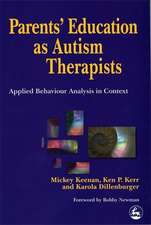The Automaticity of Everyday Life: Advances in Social Cognition, Volume X: Advances in Social Cognition Series
Editat de Jr. Robert S. Wyeren Limba Engleză Hardback – mar 1997
This 10th book in the series addresses automaticity and how it relates to social behavior. The lead article, written by John Bargh, argues that social psychology phenomena are essentially automatic in nature, as opposed to being mediated by conscious choice or reflection. Bargh maintains that an automatic mental phenomenon is that which occurs reflexively whenever certain triggering conditions are in place; when those conditions are present, the process runs off autonomously, independently of conscious guidance. In his lead article, he focuses on these preconscious automatic processes that can be contrasted with postconscious and goal-dependent forms of automaticity which depend on more than the mere presence of environmental objects or events. Because social psychology, like automaticity theory and research, is also largely concerned with phenomena that occur whenever certain situational features or factors are in place, social psychology phenomena are essentially automatic. Students and researchers in social and cognitive psychology will find this to be a provocative addition to the series.
Preț: 1005.01 lei
Preț vechi: 1225.61 lei
-18% Nou
Puncte Express: 1508
Preț estimativ în valută:
192.31€ • 200.39$ • 159.23£
192.31€ • 200.39$ • 159.23£
Carte tipărită la comandă
Livrare economică 03-17 aprilie
Preluare comenzi: 021 569.72.76
Specificații
ISBN-13: 9780805816990
ISBN-10: 0805816992
Pagini: 266
Ilustrații: Illustrations
Dimensiuni: 152 x 229 x 22 mm
Greutate: 0.59 kg
Ediția:1
Editura: Taylor & Francis
Colecția Psychology Press
Seria Advances in Social Cognition Series
Locul publicării:Oxford, United Kingdom
ISBN-10: 0805816992
Pagini: 266
Ilustrații: Illustrations
Dimensiuni: 152 x 229 x 22 mm
Greutate: 0.59 kg
Ediția:1
Editura: Taylor & Francis
Colecția Psychology Press
Seria Advances in Social Cognition Series
Locul publicării:Oxford, United Kingdom
Public țintă
ProfessionalCuprins
Contents: Preface. J.A. Bargh, The Automaticity of Everyday Life. M.R. Banaji, I.V. Blair, J. Glaser, Environments and Unconscious Processes. R.F. Baumeister, K.L. Sommer, Consciousness, Free Choice, and Automaticity. L. Berkowitz, Some Thoughts Extending Bargh's Argument. C.S. Carver, Associations to Automaticity. G. Clore, T. Ketelaar, Minding Our Emotions: On the Role of Automatic, Unconscious Affect. D. Cohen, Ifs and Thens in Cultural Psychology. W.L. Gardner, J.T. Cacioppo, Automaticity and Social Behavior: A Model, A Marriage and a Merger. C.D. Hardin, A.J. Rothman, Rendering Accessible Information Relevant: The Applicability of Everyday Life. G.D. Logan, The Automaticity of Academic Life: Unconscious Applications of an Implicit Theory. W. Mischel, Was the Cognitive Revolution Just a Detour on the Road to Behaviorism? On the Need to Reconcile Situational Control and Personal Control. E.R. Smith, Preconscious Automaticity in a Modular Connectionist System. T.K. Srull, The Vicissitudes of Social Behavior and Mental Life. J. Tzelgov, Automatic but Conscious: That Is How We Act Most of the Time. J.A. Bargh, Reply to Commentaries.
Notă biografică
Edited by Wyer, Jr., Robert S.






















